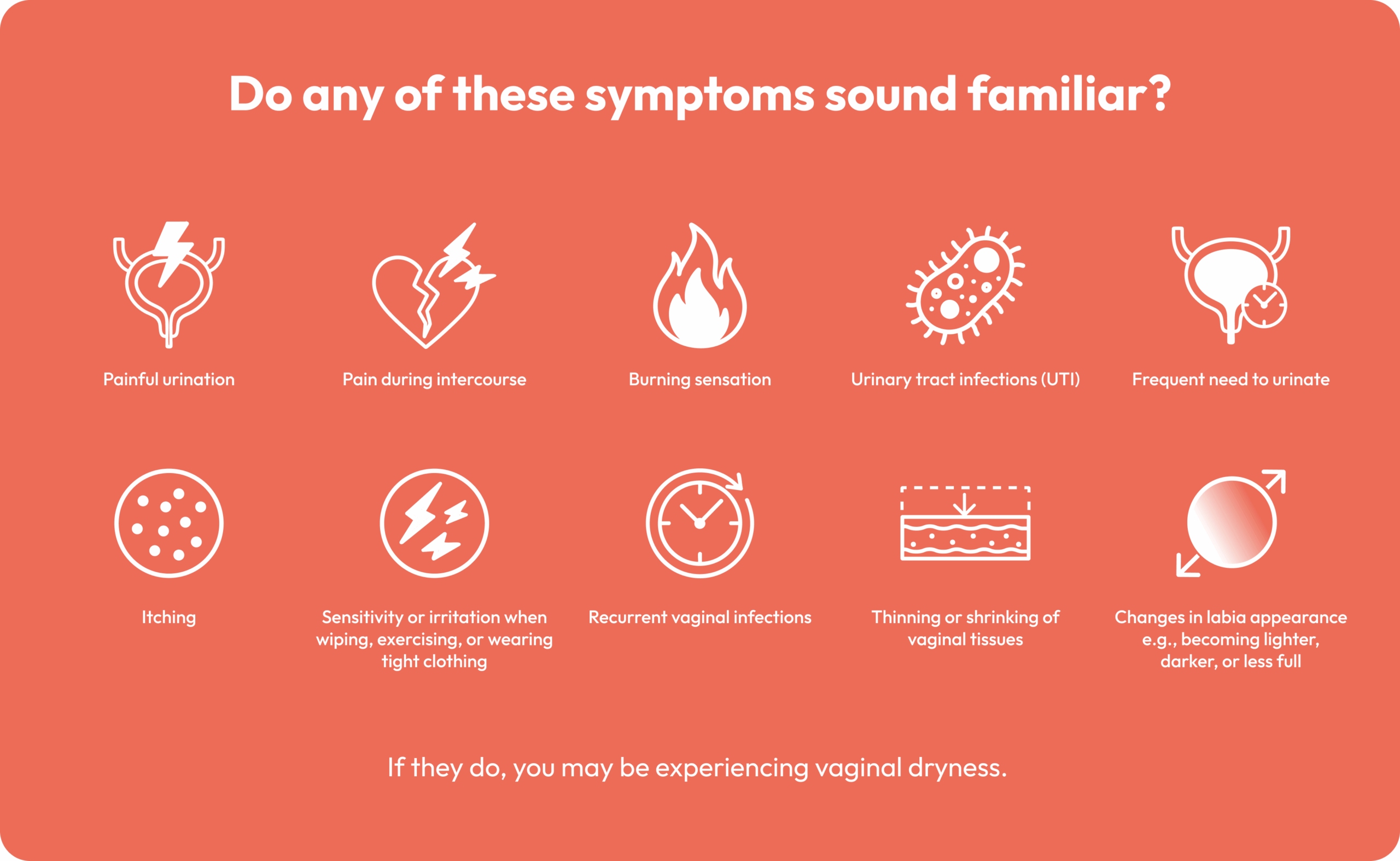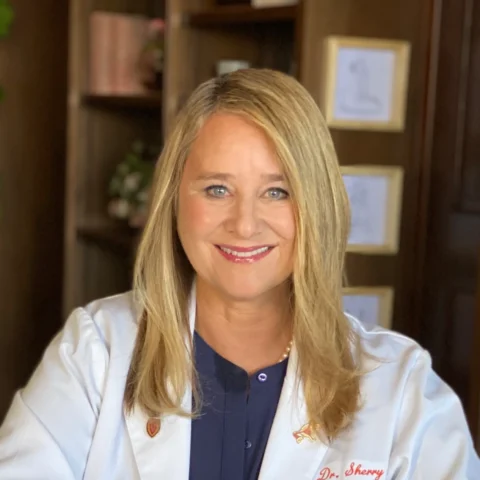Vaginal dryness: Causes, symptoms, & treatments
If you’ve started to notice dryness, irritation, or discomfort “down there,” you’re not alone, even if it feels like something no one talks about. Vaginal dryness is one of the most common symptoms of perimenopause, menopause, and beyond, yet it’s often brushed aside or left unmentioned.
The truth is, it’s completely normal, but that doesn’t mean you have to live with it. These changes happen as estrogen levels drop, affecting how the vulva and vagina stay hydrated and healthy. We’ll walk you through why it happens, what the symptoms feel like, and how to find real relief so you can feel comfortable and confident again.
What causes vaginal dryness?
Vaginal dryness is one of the most common and least discussed symptoms of perimenopause, menopause, and beyond. It’s caused by the natural decline in estrogen, the hormone that keeps the vaginal and vulvar tissues healthy, hydrated, and elastic.
Research from the American Urological Association confirms that these changes in estrogen levels can cause the vaginal and urinary tissues to become thinner, drier, and more sensitive. This is a condition known as Genitourinary Syndrome of Menopause (GSM).
As estrogen levels fluctuate during perimenopause (which can begin up to 10 years before menopause) and drop further after menopause, the tissues of the vulva and vagina lose moisture and thickness. The result is dryness, irritation, itching, and discomfort that can make everyday activities and intimacy quite painful.
Dr. Sheryl Ross (Dr. Sherry), Chief Medical Officer of Women’s Health at QuickMD, explains:
“With perimenopause and menopause, there is the loss of estrogen nourishing and hydrating the vulva and vagina, causing the tissue to become dry, pale, and dehydrated. The labia lose fullness and collagen, and the vagina itself can shrink. The medical term for this is genitourinary syndrome of menopause (GSM), formerly known as atrophic vaginitis.”
GSM also includes urinary changes, such as increased frequency, urgency, or urinary tract infections, since the bladder and urethra are influenced by the same hormonal shifts.
Symptoms of vaginal dryness
Vaginal dryness can range from mildly uncomfortable to truly disruptive. Common symptoms include:
- Itching, burning, or stinging sensations
- Pain or discomfort during intercourse
- Sensitivity or irritation when wiping, exercising, or wearing tight clothing
- Recurrent urinary tract or vaginal infections
- Thinning or shrinking of vaginal tissues
- Changes in labia appearance, e.g., becoming lighter, darker, or less full
Only about one in four women talk to their healthcare provider about vaginal dryness, even though it’s highly treatable. You should never feel embarrassed to bring it up and seek relief because it is absolutely possible.


Treatment for vaginal dryness
Menopause hormone therapy (MHT)
MHT, sometimes referred to as hormone replacement therapy (HRT), is the most effective treatment for vaginal dryness caused by perimenopause and menopause. By restoring estrogen, MHT brings hydration and elasticity back to the vaginal tissues.
A systematic review in the journal Menopause found that vaginal estrogen therapy significantly improves dryness, irritation, and pain during intercourse and bladder symptoms with minimal side effects.
For women whose dryness is localized, vaginal estrogen (available as a cream, tablet, or ring) delivers relief directly where it’s needed with minimal absorption into the bloodstream. For more systemic symptoms, estrogen can also be given through patches, gels, or oral tablets.
Dr. Sherry reminds us:
“GSM does not have to ruin a sexual relationship with your partner if you start using vaginal estrogen regularly. Keeping the vulva and vagina hydrated and moisturized with products designed specifically for this sensitive, pH-balanced area must be a priority. I have always said that women need to treat their vulva and vagina like their face, using specially designed products to clean, hydrate, and moisturize these delicate areas every day.”
Other prescription options include DHEA vaginal suppositories or ospemifene (Osphena), a non-hormonal medication that works like estrogen in the vaginal tissue.
Natural remedies for vaginal dryness
If you prefer non-hormonal or natural options, several lifestyle and over-the-counter options exist:
- Vaginal moisturizers and lubricants: Look for pH-balanced, fragrance-free options designed for sensitive skin. Hyaluronic acid-based moisturizers can provide long-lasting hydration.
- Hydration: Aim for at least eight glasses (about 2 liters) of water daily. Staying hydrated helps keep the skin and tissues of the vagina moisturized from within.
- Warm baths with natural oils: Dr. Sherry recommends 20-minute baths three to four times a week with a handful of extra virgin coconut oil to rehydrate the vulva and body.
- Avoid irritants: Skip fragranced soaps, bubble baths, scented wipes, and harsh detergents. These can strip natural oils and disrupt vaginal pH.
- Choose breathable fabrics: Cotton underwear and loose-fitting clothes reduce friction and irritation.
- Regular sexual activity: With or without a partner, it increases blood flow and maintains vaginal elasticity.
“The old adage, ‘if you don’t use it, you’ll lose it,’ applies here,” says Dr. Sherry. “Regular vaginal stimulation helps maintain healthy tissue and circulation.”
If symptoms persist or worsen, a QuickMD doctor can help create a treatment plan that fits your comfort level and medical history.
Feeling dry, irritated, or uncomfortable? See how hormone therapy can help you feel like yourself again.
Discomfort shouldn’t be your new normal. QuickMD doctors offer personalized perimenopause and menopause care to relieve vaginal dryness, restore hydration, and help you feel more like you, so you feel confident and comfortable.
We just launched our Menopause Hormone Therapy Membership in select states, and your first month’s on us. You’ll get to meet with a doctor, ask all your questions, and see if treatment might help.
If you love it and want to keep going, it’s $ 79/month after that, with special member pricing on medication and regular access to your doctor. And if you decide it’s not for you – that’s totally fine too. Get started by booking your free visit now.

